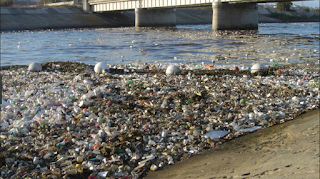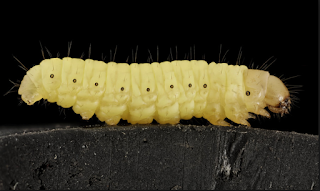Can This Critter Help Solve Our Plastic Problem?
 About 300 million tons of plastic is produced globally each
year. Of those 300 million tons, 8
million metric tons end up in our ocean which translates to 17.6
billion pounds (one metric ton equals 2,205 pounds). It takes a plastic bottle
about 450 years to decompose, and a plastic bag 10-20 years to decompose.
About 300 million tons of plastic is produced globally each
year. Of those 300 million tons, 8
million metric tons end up in our ocean which translates to 17.6
billion pounds (one metric ton equals 2,205 pounds). It takes a plastic bottle
about 450 years to decompose, and a plastic bag 10-20 years to decompose.
As it
turns out, the convenient aspects of plastic, such as its lightweight and
durability, makes it harder to get it out of the ocean once it starts to break
down into smaller pieces. In recent years there have been initiatives to clean
our oceans and collect the plastic that has accumulated. Although this is a
start and will help reduce the amount of plastic in our oceans, this is a
retroactive solution. What we need is a
proactive solution, preventing plastic form entering the ocean.
 Recently, scientists have discovered the ability of the wax worm, a caterpillar that is able to biodegrade
plastic. Researchers ground the larva into a paste and spread it over plastic,
again the plastic degraded. This is an indication that it is chemicals in the
caterpillar that are responsible. So, why don’t we have massive farms of these
caterpillars to break down plastic and solve our problem? Because like all
things there is a downside. The wax worm is just that it eats wax, more
specifically bees wax. These caterpillars have the potential to significantly
damage the bee population. In a world without bees, plastic pollution would be
the least of our worries.
Recently, scientists have discovered the ability of the wax worm, a caterpillar that is able to biodegrade
plastic. Researchers ground the larva into a paste and spread it over plastic,
again the plastic degraded. This is an indication that it is chemicals in the
caterpillar that are responsible. So, why don’t we have massive farms of these
caterpillars to break down plastic and solve our problem? Because like all
things there is a downside. The wax worm is just that it eats wax, more
specifically bees wax. These caterpillars have the potential to significantly
damage the bee population. In a world without bees, plastic pollution would be
the least of our worries.
All in all, there is not currently one good solution on stopping plastic from entering our oceans. As with most things it will take a combination solutions such as: reducing our overall usage of plastics, recycling what plastics we do use, and finding a viable method of biodegrading plastics.
For more information please visit:

Environmental effects such as unsustainable farming practices, irresponsible farming like the excessive use of manure will have an adverse effect toward climate change. These practices will make some places on earth less fertile, especially in the tropics, but it will also make some place more fertile, especially in the Northern latitudes as state in our textbook. Agriculture as a practice has always damaged the environment, this consequence has being present since our ancestors went for hunting, this activity is negative because the intrusion on man into nature. The environment was directly affected because its original form was altered. This kind of invasion later demonstrate the consequences, among the most popular we have habitat of animals being transformed and moved away, the waterways were altered because the creeks were blocked, and new pathways were created for man to use. By looking at this adjustment to Mother Nature it is fair to say that the environment was being transformed into a habitat where man was forcefully wanted to be part of.
ReplyDeleteWhen man started dominating the environment and implanting changes to nature is when the beginning of primary environmental effects were taking place, things started to change to get worse. What is interesting is that the changes caused to nature because of farming was only taken as a serious matters if would have caused damage to humans, without taking into consideration that by acting against the environment a serious problem was occurring. If we take a look into the crucial environmental effects of modern agriculture we can mention that the effects are negative, probably man was not too knowledgeable back then of how have a sustainable environment. As the population has being growing a modern agriculture and commercial farming was becoming a necessity, with these necessities environmental effects were growing and environmental impacts have increased, including potential degradation of the soil.
Omar Lara
The term “Green Revolution” refers to advancements in agricultural practices and the development of new high-yielding seed varieties that began in Mexico in 1944 at the Center for Wheat and Maize Improvement, a non-profit agricultural research institute under the direction of U.S. agronomist Norman Bourlag. The introductions of these new agricultural technologies were techniques in an effort to improve food availability and access in Asia and Latin America.
ReplyDeleteThe green revolution led to increased levels of environmental destruction in implementing countries by necessitating higher levels of pesticide, herbicide, and fertilizer use. So re-orient agricultural training programs away from Green Revolution-style agricultural practices is the best choice since seems to be not environmentally beneficial because of higher levels of pesticide involved. Also another reason that explains better why the Green Revolution may not be the best choice is because was not successful in Africa. Although the majority of arable lands in Africa are rainfall dependent and somewhat less suited to irrigation, this fact also shows that green revolution techniques may not be the best option. Last but not least is that the Green Revolution is that it increased income inequality in certain countries, particularly in Latin America.
When we discussed in our class the debate regarding the utility of the agricultural technological advancements attributed to the "Green Revolution” we mentioned dramatic gains in agricultural productivity in some countries that implemented the change. The most important benefit was the impact on agricultural productivity and food availability, environmental protection and sustainability, and income inequality and the poor. These benefits are what makes the green revolution is definitely a topic that needs to be evaluated from different perspectives. On one hand we have this great promise to end hunger through some advance seeds, agrochemicals and genetically modified crops. On the other hand we have the environmentalist in the United States condemning some multinational corporations responsible of these advances of attempting to impose “food totalitarianism” on the world. We all know that corporations do not have good reputation when comes to make profits, and they only look for self-interest, this bring us to the conclusion that if corporations are being beneficiated with the Green Revolution Evaluating then we have to be careful and study all the possible outcomes. Among the results of these new advances have brought to light positive effects, such as the "miracle" seeds which quickly spread to Asia, and soon new strains of rice and corn were developed as well.